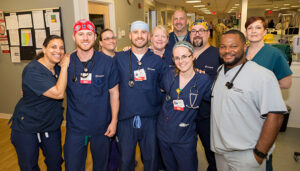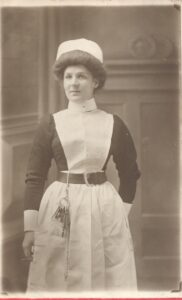Why Nursing is the ‘Bedrock’ of Healthcare

Nursing, by definition, is a selfless profession where giving and supporting the patient through their illness knows no end. As Florence Nightingale, one of the great nursing pioneers once said, “Nursing is the gentle art of giving”. Since that time, so much has changed about the nursing profession and the hospitals nurses work in. Despite the rapidly changing healthcare environment, nurses will always be the artisans of care. Speaking about her chosen profession in 2015, Christian Belle an RN, BSN, said, “Our job as nurses is to cushion the sorrow and celebrate the joy, every day while just doing our jobs”.

Nurses- no matter what the century- have always been their hospitals’ foot soldiers on the front line. Despite, a nurse’s dedication, passion and skill; there is no measuring rod to show how instrumental they are to the medical field. However, what research does tell us, is that nurses are central to patient outcome. Studies show that “… hospitals with low staffing levels of nurses usually have higher rates of poor patient outcomes”. In hospitals where there is a lower volume of nurses, there is also a higher chance of…”pneumonia, shock, cardiac arrest, UTIs, and a number of other preventative conditions”.
The Multi-Diverse Role of Nursing

As care givers, nurses are encouraged to take a holistic approach. This school of thought encourages nurses to see that the “whole person is more important than the sum of their parts”. Thus, nurses may need to address patient’s cultural, spiritual, and emotional needs simultaneously.
In their role as the most visible part of the healthcare team, nurses need to be effective communicators. For the nursing professional, finding the right approach for the appropriate situation is a key part of their job. Being a nurse also involves acting as educator for the patient. In certain situations patients may be confused about certain procedures. This is where the nurse steps in to not only fill in the facts, but put their patients mind at ease.
Nurses also need to be reliable judges. By using their sound judgement, nurses work to ensure positive outcomes for the patient. This entails assessing a patient, recognizing the problem, then putting into place interventions that aid a patient’s recovery. But, what drives people to become a nurse. Is it an inner calling that spurs graduates to pursue a career in nursing?
The Inner Calling of Nursing

Over the years, salary has never been a primary reason for entering the profession. In recent times, in a report published by Nurse.com, the salary for nurses has risen from 1.3% to 2.6%. In fact, American nurses make more in comparison to nurses in other parts of the world. Robert G Hess JR, PhD, RN, FAAN, writing for Nurse.com blog says, “Many nurses in the U.S., including staff at the bedside, earn six-figure salaries”. In comparison with education, religion and other altruistic professions; nursing tends to offer better compensation. Melissa Moffatt BSN, RN was cited in that same blog as saying “I hear that (people are entering nursing for the money) more and more these days”. The problem is, of course, when students realize that Nursing is real hard work, they exit the field. (https://www.nurse.com/blog/2017/04/21/we-work-hard-for-the-money-my-perspective-on-nurse-salaries/)
The key question is why choose to become a nurse? Sure money is more attractive than it ever has been. But, surely there must be much more to becoming a nurse than being tempted by a comfortable living?
Many nurses, just like teachers, or religious ministers, discover at some time during their lives, an inner calling to help people. They pursue nursing because they are driven to make a real difference to someone’s life. Surely, there is no greater feeling or reward than saving a life.
In fact, when Robert G. Hess opened this up for a Facebook debate between his nursing friends, the majority of them said that the motivation to go into nursing should come from within. As Donna Huether, RN, charge nurse for Newton Medical Center, Ogdensburg NJ says, “… It has to be in your heart, or you shouldn’t be doing it at all.”
This inner motivation is, probably, what spurs nurses not to work just in hospitals, but to use their craft in other settings, outside hospitals. These external environments can be perhaps even more challenging than hospitals -none more so than for correctional nurses.
Making a difference in the darkest of places

The work of correctional nurses, often goes underneath the radar. As minoritynurse.com states “correctional nursing is very often absent from the landscape of nursing”.
In contrast to care provision in a hospital, a correctional facility’s care is essential and not elective. The correctional environment is not made to be patient friendly, brimming with warmth and welcoming. In contrast to an ordinary hospital environment, a correctional facility can be dark and intimidating.
Perhaps, more than any other type of nurse, correctional nurses can make a powerful impact as an advocate for patient care. Correctional nurses often work with a disproportionate number of minorities. This puts them in a position to “shine a light” on health issues that afflict certain populations more frequently’.
Nurses that work in correctional facilities need to be generalists. As one correctional nurse comments, they, “…. should be poised to leap from oncology to mental health at a moment’s notice”. (https://minoritynurse.com/correctional-facility-nursing/)
The Nursing Artist: Nurses! Change your Work Environment

No matter what the setting, a nurse’s ability to affect an environment positively is an essential skill. For Edgar Palomo, a talented nurse who works in Cooks Children’s Hospital, adding a bit of color comes very naturally.
Edgar Palomo, aged 27, has been working for Cooks Children’s hospital for 4 years. Palomo creates art work on white boards in around the hermatology/ oncology ward. This unique nursing artist says that it was through word of mouth that others heard about his art work. Staff, patients, and their families began to request Palomo to recreate their favorite character from Disney movies. As his following grew and grew, soon everyone was talking about this nursing artist. Despite his undoubted talent, Palomo never wanted to be an artist. He only wanted to help people as a nurse. He states, “I never wanted to pursue anything in art, so doing the drawings helps me to combine the two together in a positive and therapeutic manner.”
Nursing in this environment can be both physically and emotionally draining for staff, patients, and their families. Adding color and humor to their day, Palomo’s art helps to enhance the hospital environment, for both patients and visitors, and coworkers, as well.

Many nurses and medical staff are following Palomo’s lead in enhancing their work environment. Yet, changing a work environment does not mean you need to do a revolutionary act. It can be as simple as improving your interaction with patients by adopting a more positive approach. Smiling is infectious and not only has a positive effect on patients, but also the nurse themselves. When a person has a positive outlook, it can make their work go much easier.
Another positive way to affect a working environment, is by putting up thank you boards or boards of recognition. One hospital has cardboard hands that staff write on, and then pin to boards. They do this when they feel like one of their team deserves recognition. Simple acts like this has shown to boost staff morale and mood. These simple changes have also shown to be effective in creating a close-knit nursing team environment.
Nursing, a profession for the truly dedicated

To be a nurse, a person needs to be truly committed and to be driven to go above and beyond the call of duty. Being a nurse is not just about being an artisan of care, it is a diverse role that entails being an educator, someone that patients can trust, and a key decision maker. Even though correctional nursing is very often not recognized, their contribution is valued by the institutions where they work.
Other nurses are able to add vitality and humor to the environments like the nursing artist, Edgar Palomo; however, nurses and medical professionals need not make drastic changes. Changes can be as simple as trying to improve patient engagement by adopting a positive attitude. Perhaps even more crucial is making environments which recognize even small achievements. This improves staff engagement, and motivation, and will go a long way to improving patient care.
By: Jonathan Gordon, Merraine Group®
